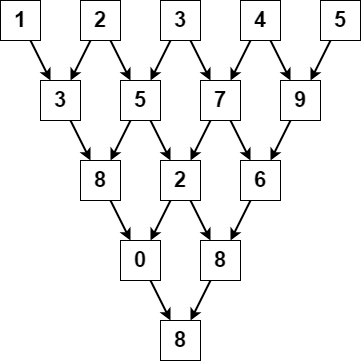You are given a 0-indexed integer array nums, where nums[i] is a digit between 0 and 9 (inclusive).
The triangular sum of nums is the value of the only element present in nums after the following process terminates:
nums comprise of n elements. If n == 1, end the process. Otherwise, create a new 0-indexed integer array newNums of length n - 1.i, where 0 <= i < n - 1, assign the value of newNums[i] as (nums[i] + nums[i+1]) % 10, where % denotes modulo operator.nums with newNums.Return the triangular sum of nums.
Example 1:

Input: nums = [1,2,3,4,5] Output: 8 Explanation: The above diagram depicts the process from which we obtain the triangular sum of the array.
Example 2:
Input: nums = [5] Output: 5 Explanation: Since there is only one element in nums, the triangular sum is the value of that element itself.
Constraints:
1 <= nums.length <= 10000 <= nums[i] <= 9